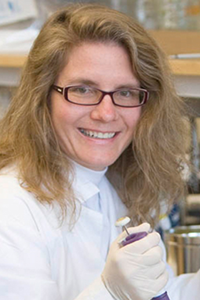
About
Laura Knoll was raised on a sod farm in Minnesota.
Education
- BA, Saint Olaf College, Northfield, MN
- PhD, Washington University School of Medicine, St. Louis, MO
- Postdoctoral Research- Stanford University, Stanford, CA
Research Description
Our research centers on using molecular genetics to study both developmental regulation and host/pathogen interactions for the parasite Toxoplasma gondii. T. gondii is a member of the Apicomplexan phylum that includes Plasmodium (causative agent of malaria) and Cryptosporidium (causative agent of water-borne outbreaks of diarrhea). We have previously employed signature-tagged mutagenesis and a chronic infection mouse model to identify genes important for virulence and the establishment of chronic infection. We have also used random insertional mutagenesis combined with a tissue culture immunofluorescence screen to isolate and characterize cyst development mutants. Creation of tissue culture conditions that induce T. gondii asexual development has allowed a molecular analysis of the asexual lifecycle stages. My lab has recently determined cell culture conditions for T. gondii sexual development by supplementing the cultures with linoleic acid. Cats are the only warm-blooded animals that lack delta-6-desaturase activity in their intestines, which is required for linoleic acid metabolism, so inhibition of delta-6-desaturase and supplementation of their diet with linoleic acid allowed T. gondii sexual development in mice. We are currently determining the pathways and products of linoleic acid oxidization and conditions for maximum oocyst yield. Mechanistic analysis of the T. gondii sexual development will permit a molecular analysis of the sexual stages and allow labs to perform classical genetic crosses on a routine basis.
We are also interested in the role of protozoans in gut health. In generating a mouse model for these protozoans, we found that mice deficient in Z-DNA binding protein-1 (ZBP-1-/-) can be orally colonized and complete the lifecycle of these human protozoans, including fecal cyst shedding. Because the mouse model for the global pathogen Entamoeba histolytica does not include oral inoculation or fecal shedding, we tested if ZBP-1-/- mice can be colonized with E. histolytica by oral gavage. We found that gavage feeding ZBP-1-/- mice E. histolytica trophozoites allowed the mice to be colonized and begin shedding fecal cysts as early as day 5 post-infection with peak shedding occurring at day 10. Most important, these fecal cysts are orally infectious to naïve mice. We are excited to continue to characterize these cysts and further develop this mouse model for the field.
Affiliations
Director of the Parasitology and Vector Biology T32
Food Research Institute-Executive Faculty
Honors
1999-2004 Burroughs Wellcome Career Award
2001-2003 Howard Hughes Medical Institute Faculty Development Program, UW-Madison
2003-2008 Shaw Scientist Award- Milwaukee Foundation
2007-2008 UW Madison Medical Education Research Committee New Investigator Award
2007-2011 American Cancer Society, Research Scholar Award
2008-2012 American Heart Association, Established Investigator Award
2009-2012 Hartwell Foundation, Biomedical Research Award
2012 UW Madison Romnes Faculty Award
2013 Outstanding Medical Student Teacher, Medical College of Wisconsin
2019 Guest lecturer of the year, St. Jude Children's Research Hospital
